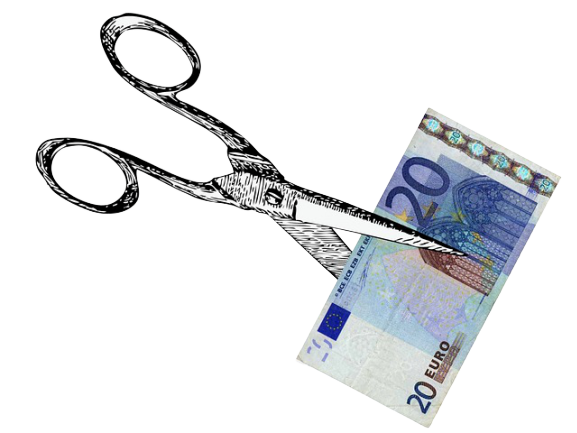My previous article, Intro to Affordability, discusses how to organize yourself in terms of how much you have to live on for your retirement. I talked about identifying necessities and desirables. This time, I’m talking a bit about how to pare down your expenses a bit so that they don’t outrun your income.
Can You Cut Costs at All?
Like I say in my podcast intro each week, sometimes there will be other people who know a lot more about a topic than I do…this is probably one of those situations. So what you’re going to read today is my opinion – don’t take it as gospel, because I’m not a financial planner or even exceptionally good at cutting costs and saving money! And you might have different ideas about what to cut and how to do it. But I’ve taken a lot of different stabs at it and I’ve got some experience with what works for me and what doesn’t…so that’s what I’m going to share. Take from it what you wish – maybe you’ll just click away, saying “What a load of crap!” or maybe you’ll find something that you haven’t thought of…whatever the situation is, remember that I’m not endorsing any particular course of action. I’m simply giving some suggestions based on my experiences.
OK – so that was my disclaimer for this post!
Everyone is always trying to find ways to save money…it seems to be the holy grail of life… I often hear “If only I could save a bit more, I could do XYZ”. We all have lots of things to spend money on, don’t we? It seems that no matter how much or how little we make, it’s all gone at the end of the month – sometimes even before the end, if we’re not careful.
Cutting costs and saving money isn’t rocket science by any stretch. But it does take a high level of commitment and THAT is sometimes hard to swallow. Humans in general tend to shy away from anything that takes effort…and making a commitment is a sure sign that effort is required. If you’re not ready to commit to a specific course of action, the outcome you’re looking for isn’t going to be achieved. It doesn’t matter whether you’re trying to lose weight, studying for an exam, or saving money. If you aren’t willing to put in the necessary work, you won’t get the desired results.
What’s Your Standard of Living Baseline?
We’ve all got an idea about the standard of living we want to have, whether that’s where we are now or higher or lower than our current point. And to be honest, your desired standard of living is very rarely LOWER than what you’ve currently got. But to cut costs and save money, it might be that you have to cut out a few of the luxuries that you’ve been enjoying. I’m not suggesting lowering your standard of living substantially; just re-adjust what you’re doing a bit…
The first thing to consider when you’re trying to cut costs is what your baseline standard of living is – that means how low are you willing to go? This flows directly from the last couple of episodes, where I had you identify the essential and desirable elements of your current life that you’re paying for now.This is where the list of desirables comes into play. So grab that list from last week…we’re going to take a look at what’s on it and see where we can start to cut some costs. If you are willing to cut to the bare bones to save as much as possible, that’s certainly achievable. But most of us want to continue enjoying life while saving for the future.
Entertainment is a category where people generally spend considerably more money than they really need to. Of course, it’s important to have some entertainment in your life – all work and no play makes Sammy a pretty dull guy, right? But what you choose as entertainment doesn’t necessarily have to be expensive. This category usually contains items like concerts & festivals, movies, music and books. It includes subscriptions to internet providers, cable TV, Netflix, iTunes, Audible, Amazon Prime and other platforms that have downloadable content for a monthly fee. While each of these subscriptions may not seem expensive on its own, when you add up a few of them, the monthly cost rises quickly. So this is a spot to begin your paring down of expenses. Look at the various subscription services and see which offer multiple streams for the cost – like Amazon Prime, for example, gives you access to music, movies and books as well as saving you money on shipping if you’re buying online. You may say “But I can get so much more content on Netflix” and that’s probably true…but do you spend enough time in front of the screen to warrant paying for both? If your true joy in life is Netflix, then definitely keep paying for it – and look at something else to reduce your costs.
Food is another area where most of us can probably cut back a bit . Good, healthy food isn’t cheap, for sure, but the number of coffees we purchase each week, the number of quick drive-thru meals or little snacks as we run errands all add up to a considerable amount of money at the end of the month. Cutting out one purchased coffee per day will probably save you a minimum of $25/month. That doesn’t sound like much, but an extra $25/month into your RRSP adds up, and it’s a small change to your routine that won’t be missed after the first couple of days. You can always make a coffee at home and take it with you, if you absolutely HAVE to have that cup in the morning. And taking a lunch to work instead of buying one is another way to save a bit. These are simple little changes that reap big rewards long-term without causing huge heartache in your daily life.
Gifts
Gifting is a category where many of us go overboard. When special occasions arise, we want to give our family and friends gifts that are meaningful and that will be appreciated and useful. Somehow that always equates to costly in our minds, but it doesn’t have to be. Most people are much more moved by and appreciative of gifts that show thought and effort…both of which were free to give, the last time I checked! A wonderful Christmas morning, for example, doesn’t need to mean tons of gifts under the tree. It could be getting up together and having breakfast and then going to serve at a food kitchen, or visiting a nursing home or hospital where the residents don’t get to go home to family.
Vacations is a category where many of us could probably find savings. The majority of people save up some money for a vacation but then once they’re on the vacation, they splurge and put a bunch of extra expenses on a credit card because they’re living in the moment. To this, I say simply be cognizant of what you’re spending…take a look at that souvenir before you fork out what’s probably at least 2 or 3 times its actual worth. Is it something you’re going to use after the vacation or is it something that’s going to sit on a shelf or in a box because it’s really got nothing to offer? If it’s the latter, take a picture of it instead of buying it!
I don’t suggest that you try cutting down in all areas of your life at once. That’s pretty much a recipe for failure unless you’re very determined and committed to saving money. I suggest maybe trying one cut-back for a month, to see how that goes. Once you’re satisfied that the world hasn’t collapsed in on you, you can cut back on something else. Slowly but surely, expenses will decrease and you probably won’t even notice the change in lifestyle. But if all is done correctly, you should notice either an increase in your disposable income or an increase in your savings account, if you have taken the action of redirecting the extra money that way from the start.
I’d love to hear what you do to cut costs. What are your money-saving tips that you can share with others? Drop a comment below!


